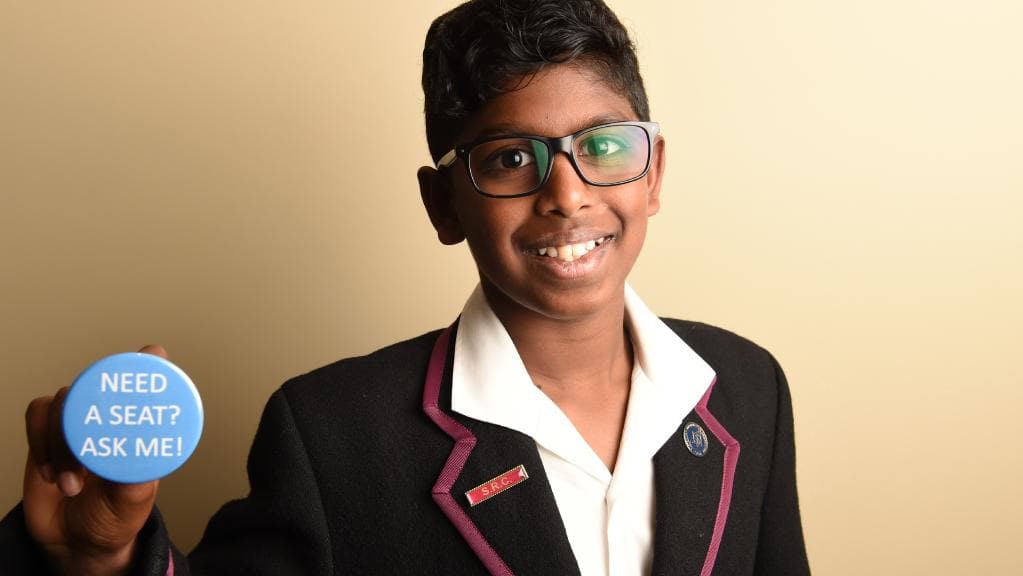
Spelling bee winner’s mission to promote kindness on public transport
HE WON the nation’s hearts as the first Great Australian Spelling Bee victor, now Anirudh Kathirvel is on track to promote kindness on public transport.
The Keysborough lad said his self-funded “Need a seat? Ask me!” badges for commuters willing to relinquish their spot would give passengers who had difficulty standing more confidence to request a seat.
WHAT WOULD MAKE YOU GIVE UP YOUR SEAT?
He was inspired by a Leader story about “Please offer me a seat” badges being trialled on London’s trains, but cleverly flipped the idea to avoid stigmatising people with health conditions.
HAVE YOUR SAY: Would you wear one of Anirudh’s badges? Tell us below.
“It seemed that the main issue with the (London) badges was that people with disabilities felt labelled, so to counter that I thought about a reverse badge,” the 11-year-old said.
CAN MELBURNIANS REALLY BE THIS RUDE?
The Haileybury student said there were some people who refused to stand up for others, but it was more common that commuters were occupied by their phones, books or listening to music and didn’t notice people around them.
“I want to be able to promote a helping culture through non-verbal communication,” Anirudh said.
The generous youngster recently ordered 100 badges with his birthday money. For his 10th birthday he had raised $3000 for the Royal Children’s Hospital.

Last month, Leader reported on Transport for London’s six-week trial of “Please offer me a seat” pins for people with hidden health conditions who find it difficult to stand on trains.
But while Victorian health and disability advocacy groups said Melbourne’s public transport was tough for people with hidden conditions — for example chronic pain, nausea, vision or balance problems — they raised concerns that “labelling” people could stigmatise them.
WHY DOES IT TAKE 90 MINUTES TO GO 3KM?
Anirudh said he was targeting school students with his badges and he hoped to attract sponsors to help him print more pins as the movement gained traction.
Disability Advocacy Victoria chairwoman Melanie Muir said this was a much better idea than the “Please offer me a seat” badges.
“I was just talking to someone yesterday who has chronic pain and didn’t like to ask for a seat.(This) helps to remove the uncertainty of who to approach if people are willing to identify themselves as seat givers,” Ms Muir said.
Public Transport Victoria spokesman Nicholas White said the authority expected all commuters to make priority seating on trains available to passengers with special needs upon request.
“It’s great to see young people thinking of innovative ways to strengthen the culture of good etiquette on public transport,” Mr White said.
Asked whether he would be happy for people to make their own badges similar to his, Anirudh replied: “That would be pretty nice if my idea was an inspiration to others.”
Commuters who would like to request a badge can visit facebook.com/Offeryourseatandshowyoucare/

